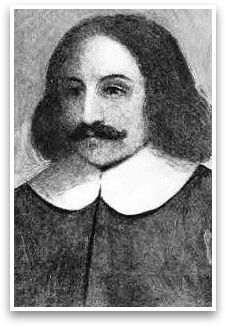
William Bradford
With William Bradford's writings, we are privy to the early life of that group of American settlers popularly known as "Pilgrims." A highly self-educated farmer and religious Separatist, Bradford shows us first-hand (and without polish) the life of those early European immigrants who saw themselves as establishing a nation founded on biblical principles and divine guidance.
Indeed, not for these Americans an established separation of church and state. Bradford's description of the so-called "Mayflower Compact" shows the decidedly theocratic government of these early settlers. They saw themselves as being guided by the "good providence of God."

Themes and Facts
- A self-educated farmer.
- Heavily influenced by “Scrooby” community of Separatists and thought the church could not be reformed from within.
- Governor of the “Pilgrims” for most of his life in the new world.
- Tells history of his people through the lenses of God’s providence.
- Documented the history of the pilgrims - both good and bad - in “Of Plymouth Plantation.”
Study Questions
- Who are the so-called “Pilgrims”? What makes them distinct?
- Why did they leave England? Holland?
- How did they leave for the new world? What was the nature of the journey?
- What happened when they made it to their “promised land”?
- How did they survive? What challenges did they face?
- Who is Bradford’s audience? Why write this history?
Regardless of your views on the theocratic nature of the early American settlement, the candid yet devout nature of Bradford's "Of Plytmouth Plantation" gives us a stark and revealing look at the lives of the early Pilgrims as well as their understanding of themselves as a people called and set apart by God.